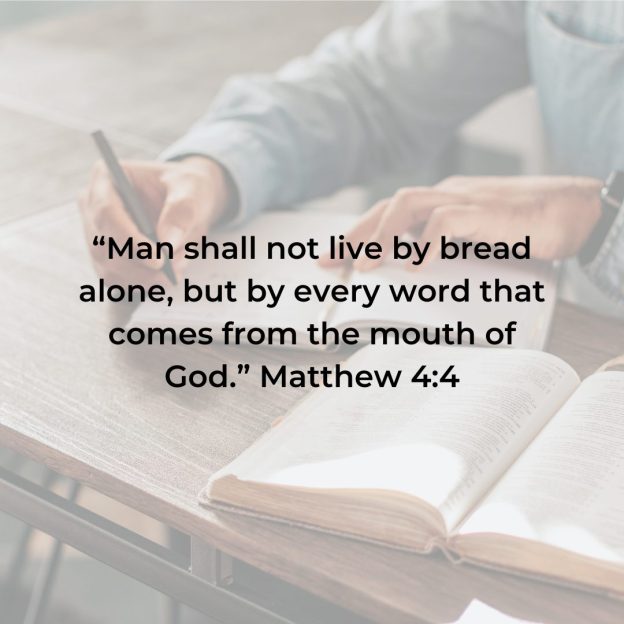What is Faith in the Bible?

Dr. Elton Trueblood once said
Faith is not belief without proof, but trust without reservation.
Faith is the animating center of our life with God.
And it’s also the central theme of the Bible. From beginning to end, faith is the prevailing theme of the Biblical narrative. Whether the faith of Noah as he built an ark on dry land or the faith of Abraham in leaving his home for a distant land, faith is at the core of what God has done and is doing throughout history.
The writer of Hebrews states
Now faith is confidence in what we hope for and assurance about what we do not see. 1
The Bible defines faith as confidence and assurance.
Confidence in God even when we don’t know where we are headed.
Assurance for what God will do even when we can’t yet see it.
Let’s look at a few of these examples of faith in Scripture to see what faith looks like and how it applies to our life with God today.
An Ark on Dry Land
At a time when sin and its effect had reached a fever pitch, God stepped in with a plan to cleanse the earth. But one man and his family found favor in God’s eyes. Noah had walked with God faithfully, even in the midst of an evil generation. And Noah’s faith in God and obedience to Him positioned him for God’s purposes.
To cleanse the earth and restore righteousness, God declares He will send a flood upon the earth. But before He does, He asks Noah to build an ark.
This ark would house Noah, his family, and two of every kind of animal to replenish the earth.
And this is how Noah responded to God’s command
Noah did everything just as God commanded him. 2
Noah began to build the ark without reservation, trusting that God would fulfill His word.
Even in the face of critiques and questions from others around Noah who didn’t understand him, he continued to build the boat.
The writer of Hebrews had this to say about Noah’s faith
By faith Noah, when warned about things not yet seen, in holy fear built an ark to save his family. By his faith he condemned the world and became heir of the righteousness that is in keeping with faith. 1
By faith Noah built the ark as an act of obedience to the word God had spoken to him. This act was evidence of his faith in God, and the trust without reservation that God would save him and his family.
While there may not be a natural flood coming today, we are still asked to walk with God faithfully and build what He has spoken to us to build.
Regardless of the questions or comments we might have regarding God’s commands, our response should be like Noah: to do everything just as He commands us

A Journey to a Distant Land
In Genesis 12, God calls Abraham to leave his home and head towards a land that he did not know.
The writer of Hebrews states
By faith Abraham, when called to go to a place he would later receive as his inheritance, obeyed and went, even though he did not know where he was going. By faith he made his home in the promised land like a stranger in a foreign country; he lived in tents, as did Isaac and Jacob, who were heirs with him of the same promise. For he was looking forward to the city with foundations, whose architect and builder is God. 4
Abraham obeyed and went. He heard the call from God to leave his home, and he left. He gathered his family and possessions and headed to a land that he, nor his family, knew of.
It was Abraham’s obedience to God that revealed His faith in God.
Abraham trusted that God would reveal where he was supposed to go, as he went on the journey with God.
And this is the way we continue to grow in and strengthen our faith. We, like Abraham and many other great men and women who have gone before us, grow our faith as we journey with God.
Knowing where we are headed is not a prerequisite for choosing to go on the journey with God.
Faith is simply a response to a word spoken by God.
As Paul writes in Romans 10:17
Consequently, faith comes from hearing the message, and the message is heard through the word about Christ.
Faith doesn’t originate from within ourselves.
It’s not something we have to muster up to follow Jesus.
Faith comes outside of us, a word spoken to us by Christ Himself.
Our responsibility is to obey when Christ speaks. To trust Him at His Word. That is what faith was to Noah, to Abraham, and to us today.

Questions about Faith
Let’s look at a few common questions people have about the concept of faith in the journey following Jesus.
What role does faith play in salvation?
In Christianity, faith is central to the concept of salvation. It is the means by which we receive God’s grace and forgiveness through Jesus Christ. And faith leads us to action. We live out our faith through good works as a natural response to God’s word, love and grace.
How does doubt affect your faith?
Doubt can be a natural part of our faith journey. But it can be an ideal opportunity for our faith to grow and deepen. Many followers of Jesus experience doubt at various points in their lives. And this doubt can lead to a deeper reliance on God, and a stronger, more mature faith. Doubt is not incompatible with faith. It’s often the doorway to a deeper, more authentic faith.
How can you strengthen your faith?
Strengthening our faith is a journey that can involve several different practices. Some of these practices may include regular prayer, Bible study, and being a part of close-knit communities of believers, such as church gatherings and small groups. Engaging in spiritual disciplines like fasting and sabbath can also deepen our faith. An ongoing relationship with God and a willingness to walk alongside others on the journey serves to nurture our faith in a deep way.

Faith for Today
To have faith is to trust without reservation.
It’s to surrender ourselves to God, trusting that the One who began a good work in us will bring that work to completion.
Faith is at the core of our lives as followers of Jesus.
As Leo Tolstoy once said
Faith is the force of life.
We have a rich heritage of men and women who have gone before us, modeling a life of faith. A life centered on Jesus, trusting completely without reservation. And it’s this life that God continues to invite us into.
A life of confident hope and expectation that God will fulfill His word to us and through us for His glory.
And it’s our faith that leads us to action, to movement, and to service.
James states in his letter
You foolish person, do you want evidence that faith without deeds is useless? Was not our father Abraham considered righteous for what he did when he offered his son Isaac on the altar? You see that his faith and his actions were working together, and his faith was made complete by what he did. And the scripture was fulfilled that says, “Abraham believed God, and it was credited to him as righteousness,” and he was called God’s friend. You see that a person is considered righteous by what they do and not by faith alone. 5
Faith is an essential part of our journey following Jesus.
We fully place our trust in Him to save us, heal us, and set us free from our sin and shame.
But in that freedom, our faith also creates movement in our lives, leading us to reveal our faith by what we do, how we speak, and how we live.

Are You Ready to Grow Your Faith?
If you’re ready to gain a deeper insight into the world of the Bible and see how vital faith is in the Biblical narrative, be sure to sign up for our online course: The Doctrine of Salvation.
After you complete this course, you’ll be able to
• Describe the problem which stands behind the human need to “become saved” in the biblical story.
• Identify how important concepts such as sin, faith, idolatry, sacrifice, and atonement function within the story of salvation.
• Define how individuals were saved in the Old Testament and compare this to the offer of salvation in the New Testament.
• Define the role that Jesus Christ plays in the attainment of our individual and corporate salvation.
Dr. Ronn Johnson begins the course by carefully explaining the cosmology of the biblical world, noting how the ancient reader would have understood the relationships of God, rebellious spirits, and human beings. He then moves through the biblical story itself, identifying how familiar terms such as faith, idolatry, righteousness, judgment, and resurrection find expression in the narrative of human salvation.
With over 7 hours of video content, you’ll immerse yourself in the Bible and gain deeper insight into the divine council worldview, as well as the salvation narrative throughout Scripture.
To sign up for The Doctrine of Salvation course, click here.
Search Keywords
Recent Posts
Top Women Leaders in the Bible
Author and theologian Lewis B. Smedes said From the outset, women are portrayed as essential...
The Power of Forgiveness in the Bible
Author and theologian Lewis B. Smedes said To forgive is to set a prisoner free and discover that...
How to Choose the Right Online Bible Study
Now more than ever, access to quality, online Bible study programs is right at our fingertips. The...
Online Bible Study Tools
Charles Spurgeon once said “Nobody ever outgrows Scripture; the book widens and deepens with our...

